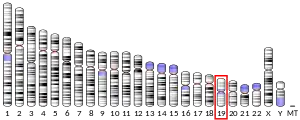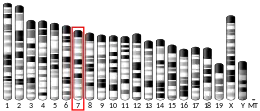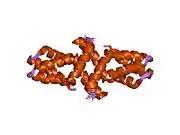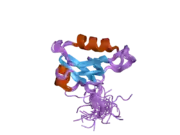LIN7B
Lin-7 homolog B is a protein that in humans is encoded by the LIN7B gene.[5][6]
Interactions
LIN7B has been shown to interact with:
References
- GRCh38: Ensembl release 89: ENSG00000104863 - Ensembl, May 2017
- GRCm38: Ensembl release 89: ENSMUSG00000003872 - Ensembl, May 2017
- "Human PubMed Reference:". National Center for Biotechnology Information, U.S. National Library of Medicine.
- "Mouse PubMed Reference:". National Center for Biotechnology Information, U.S. National Library of Medicine.
- Jo K, Derin R, Li M, Bredt DS (Jun 1999). "Characterization of MALS/Velis-1, -2, and -3: a family of mammalian LIN-7 homologs enriched at brain synapses in association with the postsynaptic density-95/NMDA receptor postsynaptic complex". J Neurosci. 19 (11): 4189–99. doi:10.1523/JNEUROSCI.19-11-04189.1999. PMC 6782594. PMID 10341223.
- "Entrez Gene: LIN7B lin-7 homolog B (C. elegans)".
- Hruska-Hageman AM, Benson CJ, Leonard AS, Price MP, Welsh MJ (Nov 2004). "PSD-95 and Lin-7b interact with acid-sensing ion channel-3 and have opposite effects on H+- gated current". J. Biol. Chem. 279 (45): 46962–8. doi:10.1074/jbc.M405874200. PMID 15317815.
- Leonoudakis D, Conti LR, Anderson S, Radeke CM, McGuire LM, Adams ME, Froehner SC, Yates JR, Vandenberg CA (May 2004). "Protein trafficking and anchoring complexes revealed by proteomic analysis of inward rectifier potassium channel (Kir2.x)-associated proteins". J. Biol. Chem. 279 (21): 22331–46. doi:10.1074/jbc.M400285200. PMID 15024025.
- Leonoudakis D, Conti LR, Radeke CM, McGuire LM, Vandenberg CA (Apr 2004). "A multiprotein trafficking complex composed of SAP97, CASK, Veli, and Mint1 is associated with inward rectifier Kir2 potassium channels". J. Biol. Chem. 279 (18): 19051–63. doi:10.1074/jbc.M400284200. PMID 14960569.
- Olsen O, Liu H, Wade JB, Merot J, Welling PA (Jan 2002). "Basolateral membrane expression of the Kir 2.3 channel is coordinated by PDZ interaction with Lin-7/CASK complex". Am. J. Physiol., Cell Physiol. 282 (1): C183-95. doi:10.1152/ajpcell.00249.2001. PMID 11742811.
Further reading
- Butz S, Okamoto M, Südhof TC (1998). "A tripartite protein complex with the potential to couple synaptic vesicle exocytosis to cell adhesion in brain". Cell. 94 (6): 773–82. doi:10.1016/S0092-8674(00)81736-5. PMID 9753324. S2CID 12465062.
- Olsen O, Liu H, Wade JB, Merot J, Welling PA (2002). "Basolateral membrane expression of the Kir 2.3 channel is coordinated by PDZ interaction with Lin-7/CASK complex". Am. J. Physiol., Cell Physiol. 282 (1): C183–95. doi:10.1152/ajpcell.00249.2001. PMID 11742811.
- Coussen F, Normand E, Marchal C, Costet P, Choquet D, Lambert M, Mège RM, Mulle C (2002). "Recruitment of the kainate receptor subunit glutamate receptor 6 by cadherin/catenin complexes". J. Neurosci. 22 (15): 6426–36. doi:10.1523/JNEUROSCI.22-15-06426.2002. PMC 6758172. PMID 12151522.
- Hori K, Konno D, Maruoka H, Sobue K (2003). "MALS is a binding partner of IRSp53 at cell-cell contacts". FEBS Lett. 554 (1–2): 30–4. doi:10.1016/S0014-5793(03)01074-3. PMID 14596909. S2CID 30329043.
- Leonoudakis D, Conti LR, Radeke CM, McGuire LM, Vandenberg CA (2004). "A multiprotein trafficking complex composed of SAP97, CASK, Veli, and Mint1 is associated with inward rectifier Kir2 potassium channels". J. Biol. Chem. 279 (18): 19051–63. doi:10.1074/jbc.M400284200. PMID 14960569.
- Leonoudakis D, Conti LR, Anderson S, Radeke CM, McGuire LM, Adams ME, Froehner SC, Yates JR, Vandenberg CA (2004). "Protein trafficking and anchoring complexes revealed by proteomic analysis of inward rectifier potassium channel (Kir2.x)-associated proteins". J. Biol. Chem. 279 (21): 22331–46. doi:10.1074/jbc.M400285200. PMID 15024025.
- Hruska-Hageman AM, Benson CJ, Leonard AS, Price MP, Welsh MJ (2004). "PSD-95 and Lin-7b interact with acid-sensing ion channel-3 and have opposite effects on H+- gated current". J. Biol. Chem. 279 (45): 46962–8. doi:10.1074/jbc.M405874200. PMID 15317815.
- Okuhira K, Fitzgerald ML, Sarracino DA, Manning JJ, Bell SA, Goss JL, Freeman MW (2006). "Purification of ATP-binding cassette transporter A1 and associated binding proteins reveals the importance of beta1-syntrophin in cholesterol efflux". J. Biol. Chem. 280 (47): 39653–64. doi:10.1074/jbc.M510187200. PMID 16192269.
- Kawai S, Fukuda C, Mukai T, Murata K (2006). "MJ0917 in archaeon Methanococcus jannaschii is a novel NADP phosphatase/NAD kinase". J. Biol. Chem. 280 (47): 39200–7. doi:10.1074/jbc.M506426200. PMID 16192277.
- Li Z, Benard O, Margolskee RF (2006). "Ggamma13 interacts with PDZ domain-containing proteins". J. Biol. Chem. 281 (16): 11066–73. doi:10.1074/jbc.M600113200. PMID 16473877.
- Sudo K, Ito H, Iwamoto I, Morishita R, Asano T, Nagata K (2007). "Identification of a cell polarity-related protein, Lin-7B, as a binding partner for a Rho effector, Rhotekin, and their possible interaction in neurons". Neurosci. Res. 56 (4): 347–55. doi:10.1016/j.neures.2006.08.003. PMID 16979770. S2CID 45834664.
This article is issued from Wikipedia. The text is licensed under Creative Commons - Attribution - Sharealike. Additional terms may apply for the media files.








